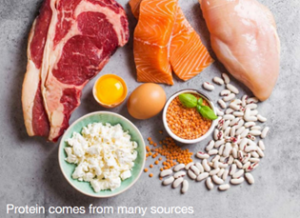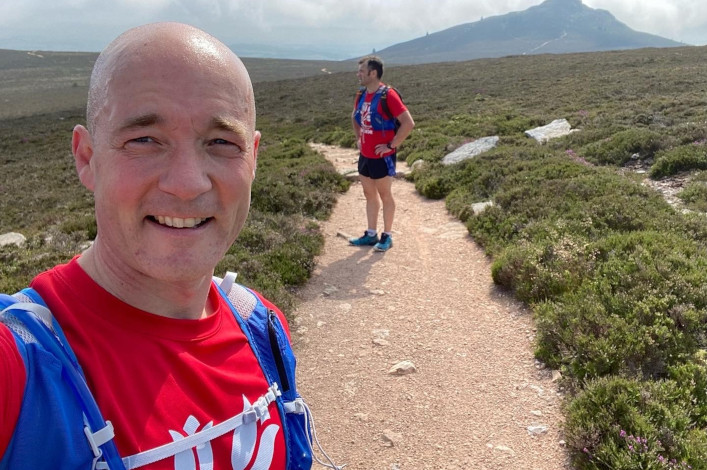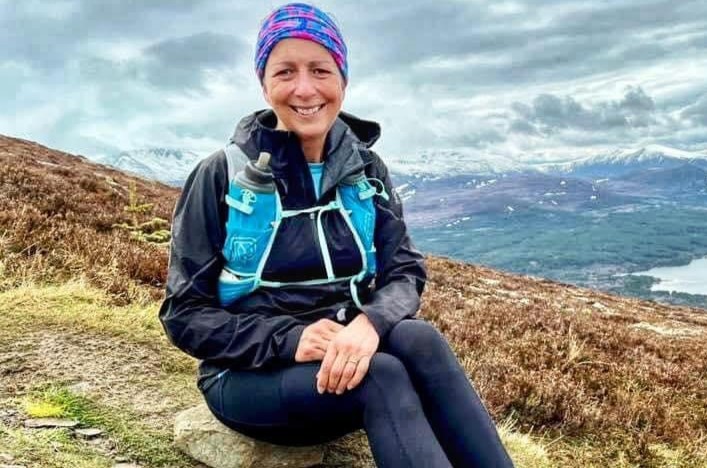Menopause and diet – information for runners
 By Gemma Holloway – Gemma is a member of Let’s Go Linlithgow Jog Scotland Group and Linlithgow AC. She is a UK HCPC registered Dietitian working within NHS specialising in diabetes but also has interests in women’s health and sports nutrition.
By Gemma Holloway – Gemma is a member of Let’s Go Linlithgow Jog Scotland Group and Linlithgow AC. She is a UK HCPC registered Dietitian working within NHS specialising in diabetes but also has interests in women’s health and sports nutrition.
Transitioning into and through the menopause is characterised by many physical and psychological symptoms – for example hot flushes, low mood, brain fog, sleep disturbances and fatigue. For some woman this can lead to a struggle in making progress with their running journeys.
The good news is that going through the menopause does not need to get in the way of running. Research has shown that physical activity can help to improve menopausal symptoms and overall health.
High cholesterol – specifically low-density lipoproteins (LDLs), also known as the ‘bad ‘cholesterol – and a reduction in the hormone oestrogen, are factors known to play a role in the decline of menopausal women’s heart health. A fall in oestrogen is also linked to changes in body composition; many women will find they gain more weight, with much of this gathering around the middle as fat, while overall muscle mass declines. Oestrogen deficiency can also disrupt sleep, leading to feeling less energised and craving higher calorie, sugar-rich foods, due to appetite-regulating hormonal disturbances. Some women end up doing less exercise because of some increased joint pain associated with lowered oestrogen levels. However physical activity, particularly running, can improve these symptoms and boost mental health, especially as part of a running group such as jogscotland.
Doing exercises focused on maintaining bone density and bone mass are important to all, however, this becomes more important for woman when they approach their 40s and beyond. Running is a form of weight-bearing exercise that helps to improve bone density and reduce risk of osteoporosis. Adding in resistance training will help to maintain muscle mass which unfortunately declines quicker during menopause. Muscle is important for strength, reducing risk of falls later in life and increases a person’s overall metabolic rate. Protein intake should also be considered – getting enough good quality protein throughout the day will help maintain muscle mass. Options can include lean meats, fish, dairy, and plant-based sources. Aim for at least 20-25g of protein per meal.
There are a multitude of supplements targeted at woman with menopause; however, there is very little evidence to support their effectiveness. Vitamin D, on the other hand, helps slow down bone loss by supporting calcium absorption, and is predominantly obtained from sunlight. In order to meet the recommended daily amount, it is a suggested that all adults consume 10 micrograms of Vitamin D per day during winter months (October- April). Calcium is important for bone health, however if women struggle to obtain sufficient calcium in their diet this can be supplemented. If using plant-based alternatives, many of these are now fortified with calcium, but do check the labels. Omega 3 is an anti-inflammatory and is cardio-protective, with richest sources coming from oily fish. If this is struggle, then a supplement may be required. Discuss any supplement requirements with GP or pharmacist before taking.
Some women find that adding phytoestrogens can help with reduced severity or frequency of hot flushes. Evidence has been found which shows that consuming two servings of soya foods or drinks per day, along with healthy diet can help reduce both the frequency and severity of hot flushes. A portion could be considered as: 250ml of soya milk, 200g soya yoghurt alternative, 90g portion firm tofu, 50g soya mince or 50g edamame beans. Soya products are also low in saturated fats which can be useful when trying to lower saturated fat intake to reduce LDL cholesterol. Soya is also an excellent source of protein, which can help support muscle mass maintenance.
Now is not the time to embark on a fad diet – it is important to take care of heart and bone health. Under-fuelling your workouts and overall energy needs will in fact lead to muscle loss, and not muscle gain, and will be counterproductive.
Although there is a lack of services available to support women going through the menopause, there have been some exciting movements in the industry and services expanding as recognises the importance support provides during this time. If any readers wish further support, they can speak to their GP or a registered dietitian for further individualised dietary support.
So lace up those trainers and join other women with menopause-friendly jogscotland groups and reap the benefits of physical activity on health and wellbeing – you are not alone!
- For more resources, including details of our #MenopauseFriendly running groups, visit the rest of our Menopause and Running pages.





Latest Facebook update
2 days ago
Photo
Share on Facebook Share on Twitter Share on Linked In Share by Email